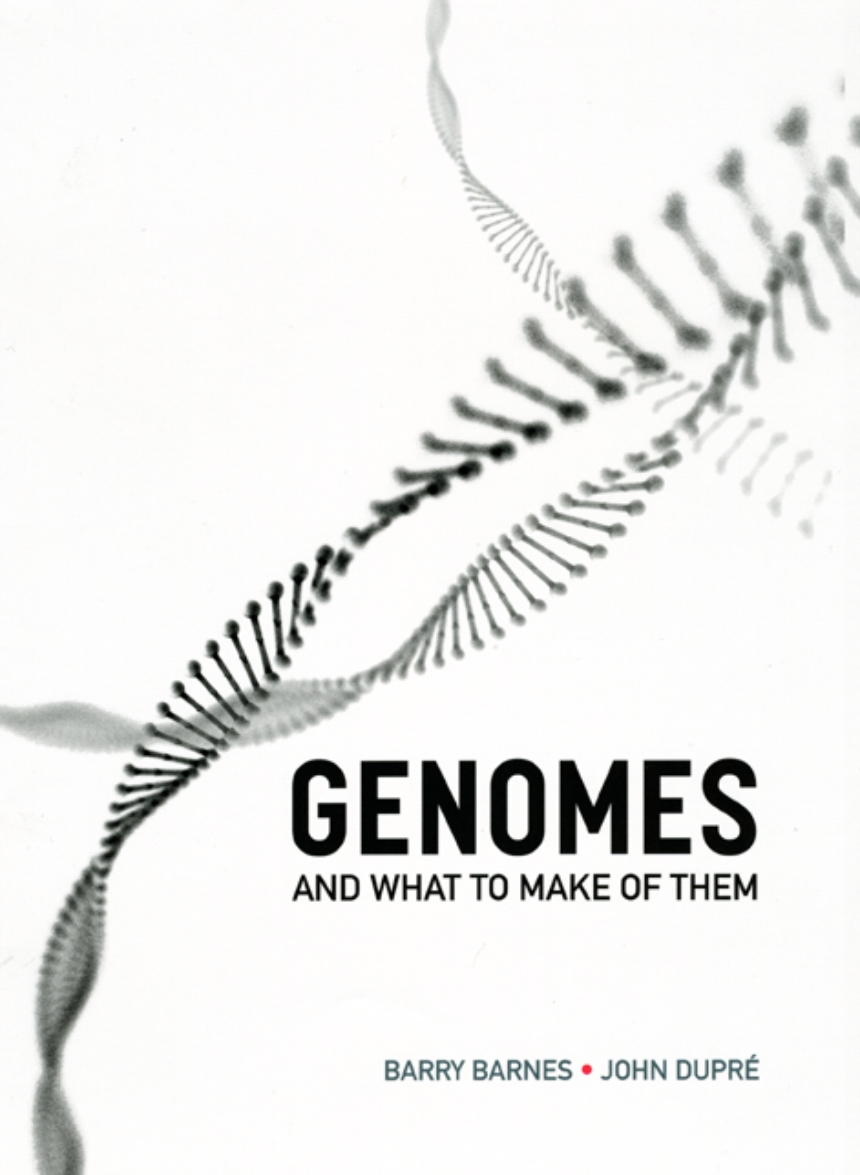Genomes and What to Make of Them
The announcement in 2003 that the Human Genome Project had completed its map of the entire human genome was heralded as a stunning scientific breakthrough: our first full picture of the basic building blocks of human life. Since then, boasts about the benefits—and warnings of the dangers—of genomics have remained front-page news, with everyone agreeing that genomics has the potential to radically alter life as we know it.
For the nonscientist, the claims and counterclaims are dizzying—what does it really mean to understand the genome? Barry Barnes and John Dupré offer an answer to that question and much more in Genomes and What to Make of Them, a clear and lively account of the genomic revolution and its promise. The book opens with a brief history of the science of genetics and genomics, from Mendel to Watson and Crick and all the way up to Craig Venter; from there the authors delve into the use of genomics in determining evolutionary paths—and what it can tell us, for example, about how far we really have come from our ape ancestors. Barnes and Dupré then consider both the power and risks of genetics, from the economic potential of plant genomes to overblown claims that certain human genes can be directly tied to such traits as intelligence or homosexuality. Ultimately, the authors argue, we are now living with a new knowledge as powerful in its way as nuclear physics, and the stark choices that face us—between biological warfare and gene therapy, a new eugenics or a new agricultural revolution—will demand the full engagement of both scientists and citizens.
Written in straightforward language but without denying the complexity of the issues, Genomes and What to Make of Them is both an up-to-date primer and a blueprint for the future.
Listen to an audio interview.
288 pages | 1 line drawing | 6 x 9 | © 2008
Biological Sciences: Biochemistry, Microbiology
Reviews
Table of Contents
Introduction
1 By Way of Background
Inherited Traits
Inherited Molecules
Practices and Techniques
2 Genes, Genomes, and Molecular Genetics
Genes and DNA
DNA
Genetic Knowledges and Their Distribution
3 Genomes
What Are Genomes?
The Strange Case of the Epigenome
New Similarities and New Differences
Reducing Complexity
4 Genomics and Evolution
Classification
Evolution
Metagenomics
.
5 Genomics and Problems of Explanation
Astrological Genetics and Explanatory Genetics
Heritability
Astrological Genomics
Beyond Astrology
6 Genomics as Power
Accumulating Powers
Genomics and Social Powers
Resisting Genomic Powers
Arguments and Institutions
7 Natural Order and Human Dignity
The Order of Things
Dignity
Human Genomes and the Order of Things
Human Genomes and the Dignity of Human Life
Arguments and Institutions Again
8 Conclusions
Genomics as Power Again
Accounting for Exceptionalism
Life without Essences: Reduction as Emancipation
Bibliography
Index
1 By Way of Background
Inherited Traits
Inherited Molecules
Practices and Techniques
2 Genes, Genomes, and Molecular Genetics
Genes and DNA
DNA
Genetic Knowledges and Their Distribution
3 Genomes
What Are Genomes?
The Strange Case of the Epigenome
New Similarities and New Differences
Reducing Complexity
4 Genomics and Evolution
Classification
Evolution
Metagenomics
.
5 Genomics and Problems of Explanation
Astrological Genetics and Explanatory Genetics
Heritability
Astrological Genomics
Beyond Astrology
6 Genomics as Power
Accumulating Powers
Genomics and Social Powers
Resisting Genomic Powers
Arguments and Institutions
7 Natural Order and Human Dignity
The Order of Things
Dignity
Human Genomes and the Order of Things
Human Genomes and the Dignity of Human Life
Arguments and Institutions Again
8 Conclusions
Genomics as Power Again
Accounting for Exceptionalism
Life without Essences: Reduction as Emancipation
Bibliography
Index
